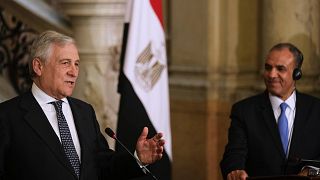Cyril Ramaphosa
South Africa's President Cyril Ramaphosa was sworn in for his second mandate on Wednesday after a tedious last month election.
Ramaphosa received a 21-gun salute, military fly-bys and a parade of honour by the servicemen.
He secured his position after garnering majority votes among members of parliament allied to the African National Congress ANC, the Democratic Alliance and other parties backed his candidacy in parliament last week.
This was the first time the ANC failed to secure the majority after the 29 May election when other parties like Zuma's outfit uMkhonto WeSizwe (MK), Malema's allied party the Economic Freedom Fighters (EFF) and the DA strengthened their numbers in the parliament.
Ramaphosa won accordingly in Parliament against a surprise candidate who was also nominated — Julius Malema of the far-left Economic Freedom Fighters. Ramaphosa received 283 votes to Malema's 44 in the 400-member house.
South Africa has been undergoing pressing problems that include some of the world's highest levels of unemployment, inequality and violent crime.
The ANC — the famed party of Nelson Mandela — had ruled South Africa with a comfortable majority since the end of the apartheid system of white minority rule in 1994.
But it lost its 30-year majority in the humbling national election on May 29, a turning point for the country. The vote was held against the backdrop of widespread discontent from South Africans over high levels of poverty, inequality and unemployment.
Analysts warn there might be complications ahead, though, given the starkly different ideologies of the ANC, a former liberation movement, and the centrist, business-friendly DA, which won 21% of the vote in the national election, the second largest share behind the ANC's 40%.











Go to video
South Africa's Ramaphosa holds phone call with Trump, to meet 'soon'
00:54
Zelenskyy Cuts South Africa Visit Short After Deadly Strikes on Kyiv
Go to video
Unprecedented trial for apartheid atrocities opens in South Africa
Go to video
South Africa appoints Mcebisi Jonas as special US envoy in bid to ease tensions
44:40
South Africa’s diplomatic gamble: strategic defiance or risky isolation [Africanews Debates]
01:59
‘Rassemblement des Bâtisseurs’ gains support ahead of Gabon election